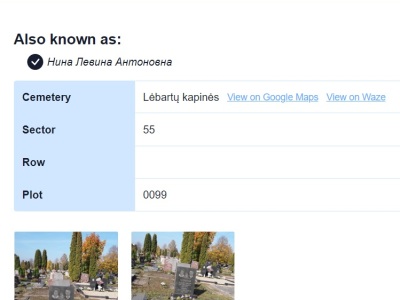Finding cemetery databases for the former USSR on Russian-speaking people is quite the challenge. It gets hard when the people moved to smaller countries of the former USSR.
A newer cemetery project is making that much easier. The bonus is that the information is searchable for free and without registration in English. People with Russian, Jewish, German, Lithuanian, Latvian, and Polish ancestry can be found in this project.
Cemety has been documenting cemeteries in Lithuania and Latvia. So far about 1.6 million graves from 515 cemeteries are searchable in Latvia, while another 1.2 million graves from 738 cemeteries can be searched in Lithuania. These databases are much larger than what can be found on FindAGrave.
The project offers the deceased’s known full name, birthdate, death date, place of burial and exact location within the cemetery, in addition to photos of the gravestone.
Here are some quick tips on using these databases:
- Search as many versions of name spellings as possible.
- Keep a list of searched names in an open document to keep track of your searches.
- Make sure to look at matches that have close spellings. Names can vary from how they were spelled in the last country where they lived or were known to relatives.
- Names that would end with ov/ow/off are more often being spelled with ov and ow on the ends.
- Remember that y’s in names could be switched to j’s.
- Don’t forget to download photos of the gravestones and copy and paste information with all the details into a file.
- If useful matches don’t appear, try searching by first name.
This project is expected to continue growing its databases. Just last month, Cemety announced expanding its project to Mažeikiai and Kupiskis districts in Lithuania at more than 200 cemeteries.
In addition to the work in Latvia and Lithuania, Cemety has sights on doing the same work in Poland, Romania and the United Kingdom.
These projects will continue to grow so check back a few times a year. Those who are interested in finding relatives and ancestors who were buried in Vilnius, Lithuania’s capital, can find another free database here. Searches can be done in Lithuanian, English, Polish, Russian or Hebrew.
More cemetery databases for Eastern European genealogy can be found on the Cemetery Databases page.
Follow this blog with the top right button to stay up-to-date on the latest free resources for your Russian and Ukrainian genealogy.
Related posts:
The User-Friendly Guide to Find A Grave for Russian and Ukrainian Genealogy
One website could become the Russian version of Find A Grave
Largest Ukrainian Orthodox cemetery in USA gets documented on FindAGrave
Large Russian-American cemetery database offers another resource for researching immigrants
Don’t blink in a cemetery
Quiz: Can you guess how former USSR immigrants changed their names?

